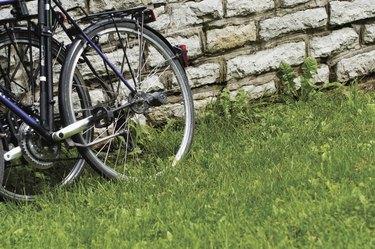
What to Look For
Several manufacturers build tires for bicycles and other small machines requiring no air and never losing inflation. Air Free, a manufacturer of such tires, guarantees such tires never go flat -- a hollow guarantee as such tires require no air and cannot go flat. Bicycle mechanic Sheldon Brown states that airless bicycle tires, originally replaced with the advent of pneumatic tires over a century ago, repeatedly surface as a "new" invention. Airless tires, originally solid rubber, now use foam technology to provide solid tires unable to experience common bicycle road damage such as pinch flats and tube punctures.
Common Pitfalls
Video of the Day
Cyclists often believe archaic airless technology is more functional than pneumatic tires, since airless tires cannot lose air. Pneumatic tires absorb shock throughout the tire, while airless tires experience shocks only in the area the blow originates, potentially damaging bicycle rims. Pneumatic tires conform and offer traction over rough surfaces; airless tires bounce over rough terrain, resulting in poor traction. Airless tires represent a Herculean effort for tire installers, often damaging rims or tools during installation. Many bicycle repair shops charge exorbitant amounts or outright refuse to install airless bicycle tires.
Video of the Day
Where to Buy
Most local bicycle shops can obtain but do not stock airless bicycle tires. Most shops will attempt to talk consumers out of purchasing such products. Many online retailers and airless bicycle tire manufacturers sell airless bicycle tires. Never purchase solid tires made of materials besides foam as solid rubber tires cause even greater trouble than foam airless bicycle tire varieties. Manufacturers often list solid rubber tire materials as elastomers. Quality puncture-resistant bicycle tires and tubes often offer protection nearing airless tire performance while maintaining comfort, durability and traction control.
Cost
Common airless bicycle tires feature prices of $25 to $50 per tire. Purchase quality puncture resistant tires for comparable prices at most local bicycle shops. Tires offering superior resistance to going flat while maintaining low weight often sell under $50 per tire. Purchase flat-resistant, often called thorn-resistant, tubes if weight is of little concern. Thorn resistant tubes often sell from $10 to $25 depending on the size needed. Tire liners represent another puncture resistant bicycle product. Tire liners, puncture-resistant strips placed between bicycle tires and tubes, typically sell for $10 to $30 a pair.